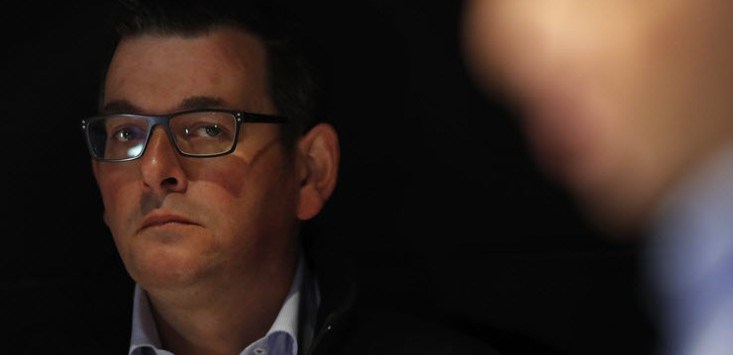
Victorian Premier Daniel Andrews. Source: AAP/Daniel Pockett.
The Victorian government is preparing to unveil a new tranche of financial support for businesses within the next week, as new modelling suggests the COVID-19 pandemic could cost inner Melbourne $110 billion over five years.
Figures pulled together by consultancy PwC for the City of Melbourne and the Victorian government predicts Australia’s second-largest city will contract by up to $23.5 billion in 2020, with an average of 398,000 jobs slated to be lost each year over the next five years.
Melbourne mayor Sally Capp is calling on both the state and federal governments to step in with emergency financial support for the city, which will be subject to tough trading restrictions for at least another two months, amid negotiations between Premier Daniel Andrews and Prime Minister Scott Morrison about the path forward for small businesses.
Andrews said on Wednesday he would discuss another round of economic support with Morrison, days after the federal government said it would wait and see how the state responded before considering any further economic stimulus.
But it appears the Victorian government is already in the final stages of developing another iteration of its Business Support Fund, with Small Business Minister Jaala Pulford revealing an announcement is imminent.
“I’m working with colleagues on that yesterday, today and tomorrow just to finalise that,” Pulford told an Inuit Quickbooks webinar on Wednesday.
Victoria’s Planning Minister Richard Wynne yesterday announced the acceleration of more than $1 billion in construction projects across the state, designed to bolster demand over the coming months as consumer-facing sectors get back on their feet.
It comes as business lobbyists warn Victoria’s conservative reopening roadmap will consign thousands more small businesses to bankruptcy in the coming months, particularly as federal government programs such as JobKeeper are scaled back.
Australian Retailers Association (ARA) chief executive Paul Zahra told the National Press Club on Wednesday that the roadmap could see as many as 50% of small retailers in the state fail to re-open in the wake of COVID-19.
“We are starting to see the emergence of a two-tiered or two-speed economy: those recovering, and those continuing to suffer,” Zahra said.
“It is very concerning to imagine what will happen when the effect of these support measures wears off.”
Andrews has sought to reassure businesses that the plan balances the need to open up the economy with the risk of a third wave of coronavirus infections across Victoria.
Neither the PwC modelling nor Zahra’s comments parsed a counter-factual scenario where another wave of infections forced the state to push back its re-opening plans even further.
“Whenever you have a high risk of the virus spreading, then the rules stay on for longer. And you can’t open up. That’s the basic logic of this,” Andrews said on Thursday.
NOW READ: Andrews under fire as ‘gendered’ reopening roadmap angers small businesses


COMMENTS
SmartCompany is committed to hosting lively discussions. Help us keep the conversation useful, interesting and welcoming. We aim to publish comments quickly in the interest of promoting robust conversation, but we’re a small team and we deploy filters to protect against legal risk. Occasionally your comment may be held up while it is being reviewed, but we’re working as fast as we can to keep the conversation rolling.
The SmartCompany comment section is members-only content. Please subscribe to leave a comment.
The SmartCompany comment section is members-only content. Please login to leave a comment.